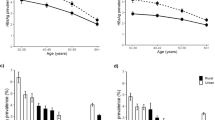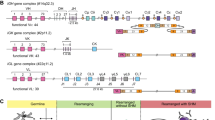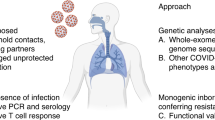Abstract
REPEATED studies have shown that Australia antigen carriers tend to group in families and there is considerable evidence that susceptibility to chronic asymptomatic infection producing Australia antigen (Au, hepatitis B antigen) is inherited as an autosomal recessive trait1–3. The occurrence of asymptomatic carriers of Au varies in different populations, ranging from 0.1 % in the United States and northern Europe to 24% in the Melanesian population of the Lau people on Malaita, as measured by immunodiffusion4. The frequency of Au carriers is relatively high in Oceania and particularly high in Melanesian populations5,6. If this trait is genetically determined, there would be a greater number of individuals who are either homozygous or heterozygous for the proposed recessive gene, Au1, in populations where the trait is common. Blumberg has suggested that these individuals may possess a selective advantage in certain environments7.
This is a preview of subscription content, access via your institution
Access options
Subscribe to this journal
Receive 51 print issues and online access
$199.00 per year
only $3.90 per issue
Buy this article
- Purchase on Springer Link
- Instant access to full article PDF
Prices may be subject to local taxes which are calculated during checkout
Similar content being viewed by others
References
Blumberg, B. S., and Melartin, L., Int. J. Lepr., 34, 60 (1966).
Blumberg, B. S., Friedlaender, J. S., Woodside, A., Sutnick, A. I., and London, W. T., Proc. natn. Acad. Sci., U.S.A., 62, 1108 (1969).
Ceppellini, R., Bedarida, J., Carbonara, A. O., Trimchieri, J., and Filippi, G., Atti Convegni Farmitalia Antigine Australia ed Epatite Virale (Minerva Medica, Torino, 1970).
Mazzur, S., Vanstory, L., London, W. T., Sutnick, A. I., and Blumberg, R. S., Res. Comm. chem. Path. Pharm., 3, 435 (1972).
Blumberg, B. S., Sutnick, A. I., London, W. T., and Millman, I., CRC, Crit. Rev. clin. Lab. Sci., 2, 473 (1971).
Blumberg, B. S., Mazzur, S., Hertzog, K., Millman, J., Bloom, J., and Damon, A., Human Biology, (in the press).
Blumberg, B. S., Am. J. phys. Anthropol., 32, 305 (1970).
Blumberg, B. S., Isr. J. med. Sci., 9, 1437 (1973).
Mazzur, S., Am. J. med. Tech., 38, 343 (1972).
Blumberg, B. S., Sutnick, A. I., London, W. T., and Melartin, L., Arch. Int. Med., 130, 227 (1972).
Groenewegen, K., Report on the census of the population (1970 Western Pacific Commission British Solomon Islands Protectorate. 1970).
Davenport, W., Scient. Am., 206, 95 (1962).
Author information
Authors and Affiliations
Additional information
Reprint requests to: American Red Cross, Blood Research Laboratory, 9312 Old Georgetown Road, Bethesda, Maryland 20014.
Rights and permissions
About this article
Cite this article
MAZZUR, S., WATSON, T. Excess males among siblings of Australian antigen carriers. Nature 250, 60–61 (1974). https://doi.org/10.1038/250060a0
Received:
Revised:
Published:
Issue Date:
DOI: https://doi.org/10.1038/250060a0
Comments
By submitting a comment you agree to abide by our Terms and Community Guidelines. If you find something abusive or that does not comply with our terms or guidelines please flag it as inappropriate.



